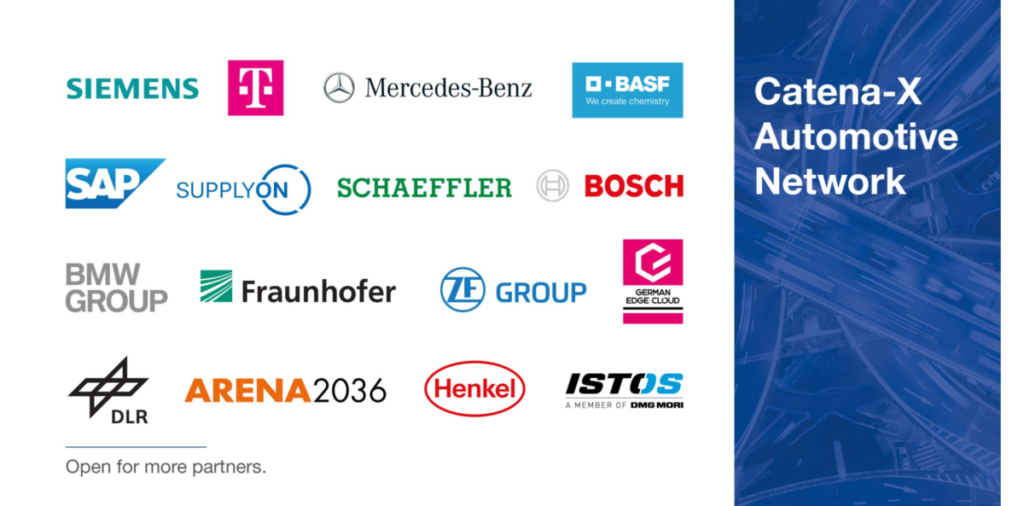And data spaces were right on center stage. Because one key enabler of the Catena-X network is the pan-European GAIA-X data infrastructure initiative, which in turn features data spaces (see our GAIA-X figure in the IDSA blog “Metamorphosis of Auto into Mobility”) and is built on data spaces technology (see Reference Architecture Model, Otto et al. 2019), specifically the International Data Spaces (IDS) standard, DIN Spec 27070 (see IDSA blog “IDS is Officially a Standard”).
From automotive alliance to Catena-X
In December 2020, Bloomberg News announced that some of the biggest German companies had joined forces to build a German auto alliance (Wilkes 2020). The founders of the partner network include BMW, Deutsche Telekom, Robert Bosch, SAP, Siemens and ZF Friedrichshafen. In the meantime, additional companies have joined the initiative including Mercedes-Benz AG, BASF SE, Henkel AG & Co. KGaA, Schaeffler AG, German Edge Cloud GmbH & Co. KG, ISTOS GmbH, SupplyOn AG, the German Aerospace Center (DLR), Fraunhofer-Gesellschaft zur Förderung der angewandten Forschung e.V and ARENA2036 as well as several small and medium-sized companies (SMEs; see Bergmann 2021). Now all participants have pledged to cooperate and collaborate jointly in an open network to advance and accelerate cross-company data exchange throughout the entire automotive value chain. Specific examples include continuously connected data chains to create digital twins of automobiles.

IDS-based data spaces and Europe’s Data Governance Act
Now what is a data space? We’re all familiar with data storage. Old hands still remember punch cards. And then hard disks, USB sticks. In companies, there were magnetic tapes. And then databases and data warehouses. And since a well-known article talked about data lakes, a piece on the Internet of Things (IoT) by experts Porter & Heppelmann in Harvard Business Review, well there has been a trend towards data lakes (2015). The German federal government’s data strategy describes a data space as “a shared, trusted space for transactions with data. A data space is based on shared standards (or values, technologies, interfaces), for example, that permit or promote transactions with data.” (German federal government 2021).
Essentially, data spaces reverse the traditional logic of data processing. Instead of central data storage, data can remain distributed if it can be made available for use by an application, ideally across organizational boundaries to ensure best quality and the right quantity. Call it just-in-time, federated data. One key problem with sharing in such n:n system has been that those involved in a transaction often do not trust each other to share data. There are various reasons for this, including concerns about data protection and competitive advantage. In short, there has been a lack of data sovereignty, the right to have control over one’s data. Once a file is sent, anything could happen to it.
This where the IDS standard comes in. The mechanics of the technology, such as usage controls and certification of components, can protect data sovereignty to the extent that a transaction can be trusted, hence creating a trusted space. The emergence of IDS as a data-sharing standard coincides with new regulation. As a key pillar of its data strategy the European Commission is proposing the European Data Governance Act (DGA) to foster the availability of data for use by increasing trust in data intermediaries and by strengthening data-sharing mechanisms across the European Union. So, it seems timely for big European companies to come together and speed up adoption of an open data sharing network, such as the new Catena-X initiative.
References
Bergmann, C. Deutsche Telekom. 2021. The alliance for secure and cross-company data exchange in the automotive industry is picking up speed. Deutsche Telekom press release (2021-03-02)
Delhaes, D. 2020. Merkel urges automotive Groups: BMW, Daimler and VW to share data. Handelsblatt (2020-10-28)
German federal government. 2021. Data strategy of the German federal government – An innovation strategy for social progress and sustainable growth. Cabinet version 2021-01-27, Federal Chancellery, Berlin
Otto, B., S. Steinbuß, A. Teuscher, S. Lohmann, et al. 2019. Reference Architecture Model Version 3.0. International Data Spaces Association, Berlin
Porter, M. E., and J. E. Heppelmann. 2015. How Smart, Connected Products Are Transforming Companies. Harvard Business Review (October)
Wilkes, W. 2020. BMW and SAP Join Forces to Build German Auto Data Alliance – Siemens, Deutsche Telekom also join the cloud data group (2020-12-01)








